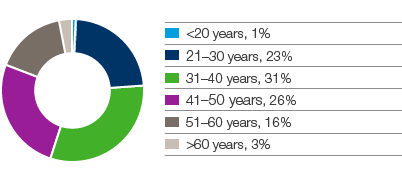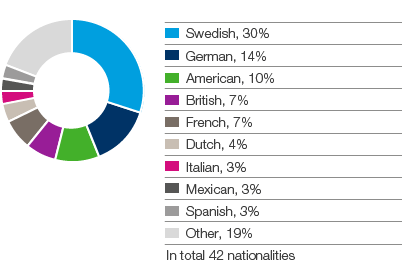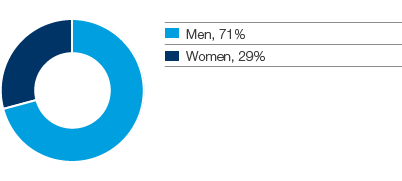Employee relations
Our success depends upon having motivated, high-performing people, working together, with a drive to constantly improve and deliver the best value for all our stakeholders. SCA’s core values – respect, responsibility and excellence – define our approach to work and behavior patterns. SCA comprises 44,000 (44,247) employees in some 60 countries, of whom 31% (32) are women. The employee turnover rate is 13% (17).
Diversity
Employee age distribution SCA Group 2015

For SCA, diversity extends beyond the typical attributes, such as gender and ethnicity – we value a mix of diverse personalities, experiences and knowledge. SCA’s Code of Conduct states that each employee is to be treated with respect and be given the opportunity for personal and professional development.
SCA strives for a higher proportion of women in management positions. In 2015, the proportion of women among SCA’s senior management* was 28% (25) and 29% (29) among senior/middle management*. Since 2007, the share of female managers has almost doubled.
Senior management comprised 24 (25) different nationalities and the corresponding figure was 42 (39) for senior/middle management. Encouraging greater diversity is part of SCA’s leadership platform and succession planning.
SCA’s senior and middle management* by nationality 2015

* Senior management comprises the highest level of management group below the Executive Management Team (CSMT). The number varies over time due to organizational changes and consists of 110–150 managers. Middle management consists of 750–1,000 managers.
SCA’s senior and middle management* by gender 2015

Employer branding
SCA’s recruitment policy is based on having the right person for the right position at the right time and at the right cost. To realize this strategy, SCA works intensively with employer branding. These efforts are based on thorough research into the needs and requirements of potential employees and SCA’s recruitment criteria.
In 2015, SCA continued to develop its global employer brand “Life Inspiring Careers.” Scarce skills and critical countries were defined from a human capital demand viewpoint and key generational groups and their demands from employers were identified.
SCA extended its cooperation with selected universities in countries identified as critical from an HR perspective. An annual university design contest is growing and includes more partner universities and an increasing number of submissions from entrants. The Group received a larger number of graduate applications from our targeted universities.
SCA is active on social media, focusing specific channels on target groups identified as key for the business.
SCA’s GO! program is a chance for newly graduated students to get their very first job in product supply, R&D, marketing and sales. It offers young professionals a chance to gain valuable work experience, develop their skills and build up a professional network.
These employer branding efforts are beginning to yield results; the number and quality of applicants for all graduate positions have changed significantly. For the 36 GO! vacancies in 2015, SCA received 2,217 applications of which 225 from partner universities.
Professional development
All professional development at SCA reflects a combination of business needs and individual aspirations. SCA strives to ensure that all employees have an individual development plan that is defined and followed up during annual performance reviews. To manage development in a structured manner, SCA has a global system for performance review and development planning in place. The reviews identify the capabilities necessary for employees to achieve the stated targets. The employees and managers agree on the manner in which these skills should be secured, primarily through internal development opportunities. The objective is to follow up the performance of every employee twice a year. In 2015, 96% (89) of white-collar employees participated in performance management reviews. The corresponding number for blue-collar employees is 86% (75). The performance reviews are sometimes conducted individually and sometimes in teams.
SCA also believes in the importance of cross-border learning, and therefore sees the benefit of mixing participants from different countries, functions and organizational levels. All development has a clear link to SCA’s daily activities, and involves real-life strategies, cases and assignments.
Significant emphasis is placed on continuous on-the-job learning through different experiences. Most development activities are thus connected to daily work and real-life situations. To enhance specific capabilities, SCA also has a number of common formal development programs. The average number of training hours per employee was 25 (22).
Leadership development
The SCA Leadership Platform defines what is expected from all SCA leaders. All leadership development activities are directly linked to this platform. To enhance specific leadership capabilities, there are five main development programs:
Leadership@SCA: Mandatory one-day onboarding program for all newly appointed leaders. The course focuses on SCA’s strategies, processes and tools, as well as general leadership and expectations placed on leaders. 457 new managers completed the course in 2015.
Core 1: A six-day program to develop leaders that have been in their role for six to 12 months. The program aims to further develop their capabilities to effectively lead others. During 2015, 365 participated in this program.
Creating Value and Driving Business Performance: Two courses to further strengthen participants’ capabilities in strategic leadership areas. In 2015, 97 leaders participated in these programs.
Core 2: To develop people’s capabilities to lead in a complex environment, engage people and drive change, SCA developed and piloted a new leadership program in 2014. In 2015, 41 leaders participated.
Other training
SCA has sustainability training programs in place that focus on innovations, claims and communication with the aim of improving the understanding of sustainability’s impact on product and services, customers and consumers.
All-Employee Survey
SCA carries out an All-Employee Survey every second year for employees at wholly owned companies. The latest survey was conducted in 2015, and received a response rate of 88.3% (86.3) of the workforce.
The survey covers a total of 47 aspects in nine dimensions. The results are expressed as indexes for leadership, innovation, customer orientation and engagement, as well as an overall SCA index. The SCA index for 2015 was 72 (70) on a scale 0-100.
All managers will prepare action plans together with their employees based on the outcome of the employee survey.
The next employee survey will be carried out in 2017.
Employee relations and union activities
Transparent communication is fundamental to the trust between SCA and its employees, as well as their representatives. Employees are encouraged to raise issues relating to employment and health and safety with their line manager. SCA recognizes the right of all employees to join unions and to partake in union activities. Union involvement varies among SCA’s countries of operation, but on average 64% (65) of SCA’s employees are covered by collective agreements.
The European Works Council (EWC)
The European Works Council (EWC) represents about 20,000 of SCA’s employees. SCA meets the EWC and other employee representatives on a regular basis to inform them of and discuss matters such as the Group’s performance and earnings, as well as health and safety and employment terms and conditions. The aim is to communicate changes well ahead of time.
Since 2013, SCA has also had an agreement with IndustriALL Global Union. IndustriALL represents 50 million employees in 140 countries in the mining, energy and manufacturing sectors. The organization was formed in 2012, combining several union organizations, including the International Federation of Chemical, Energy, Mine and General Workers’ Unions (ICEM), which previously represented SCA employees. The content of the agreement with IndustriALL largely coincides with the previous arrangement with ICEM. The Swedish Paper Workers Union is also encompassed by the agreement with EWC and IndustriALL.
Alternative forms of dialog
In parallel with SCA’s expansion, the Group encounters new circumstances and challenges, including challenges pertaining to its employee dialog. When there is no union representation, SCA establishes other channels where possible, such as workers’ councils.
In companies where SCA is not the sole or majority owner, efforts are made to exert an influence through the Board. The aim is to ensure that these companies also apply the principles of SCA’s Code of Conduct and thus respect each employee’s entitlement to freedom of association.
Organizational changes
The notice period in connection with organizational changes in the Group varies, but averages about five weeks. In connection with organizational changes, SCA works to support the employees affected. This is done through discussions with labor unions at an early stage and by preparing a social action plan that is adjusted to local conditions. The action plan normally includes assistance in seeking employment and/or education. Other tools include severance pay, early retirement and financial incentives for those who find new jobs before the end of the period of notice. Support services may comprise individual career counseling or administrative support.
In 2015, sites were closed in Mexico, France, Germany and the UK. The closures, together with other restructuring measures, affected a total of about 640 employees.
The closure of the Guadalajara site in Mexico, FlexPackPapers in Mannheim, Germany and the Orléans site in France affected 209, 110 and 119 employees, respectively. In Germany, some employees took early retirement while others reached an agreement with SCA and, as a result, no forced dismissals were necessary. In France, negotiations are ongoing. In all three cases, the severance pay exceeded the legal requirement. In Stubbins, UK and Ortviken, Sweden, paper machines were closed down. In Stubbins, the closure affected 34 employees who were all paid above the statutory requirements and, in Ortviken, early retirements and transfer to other jobs will solve a major share of the redundancies.
